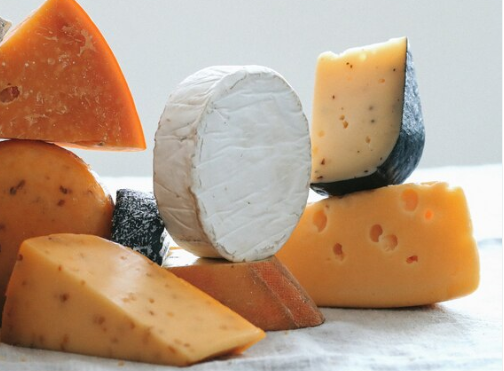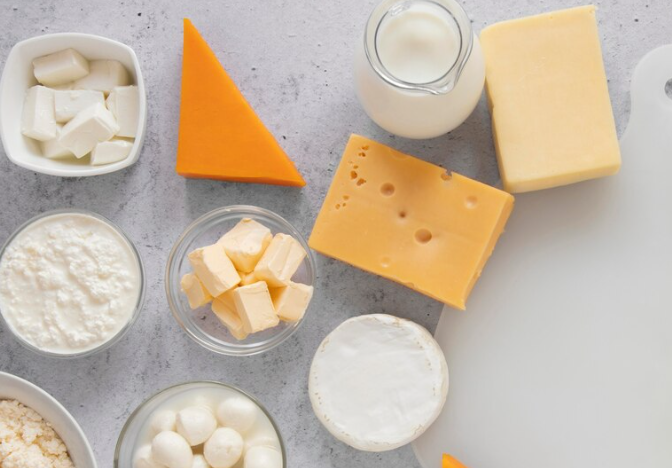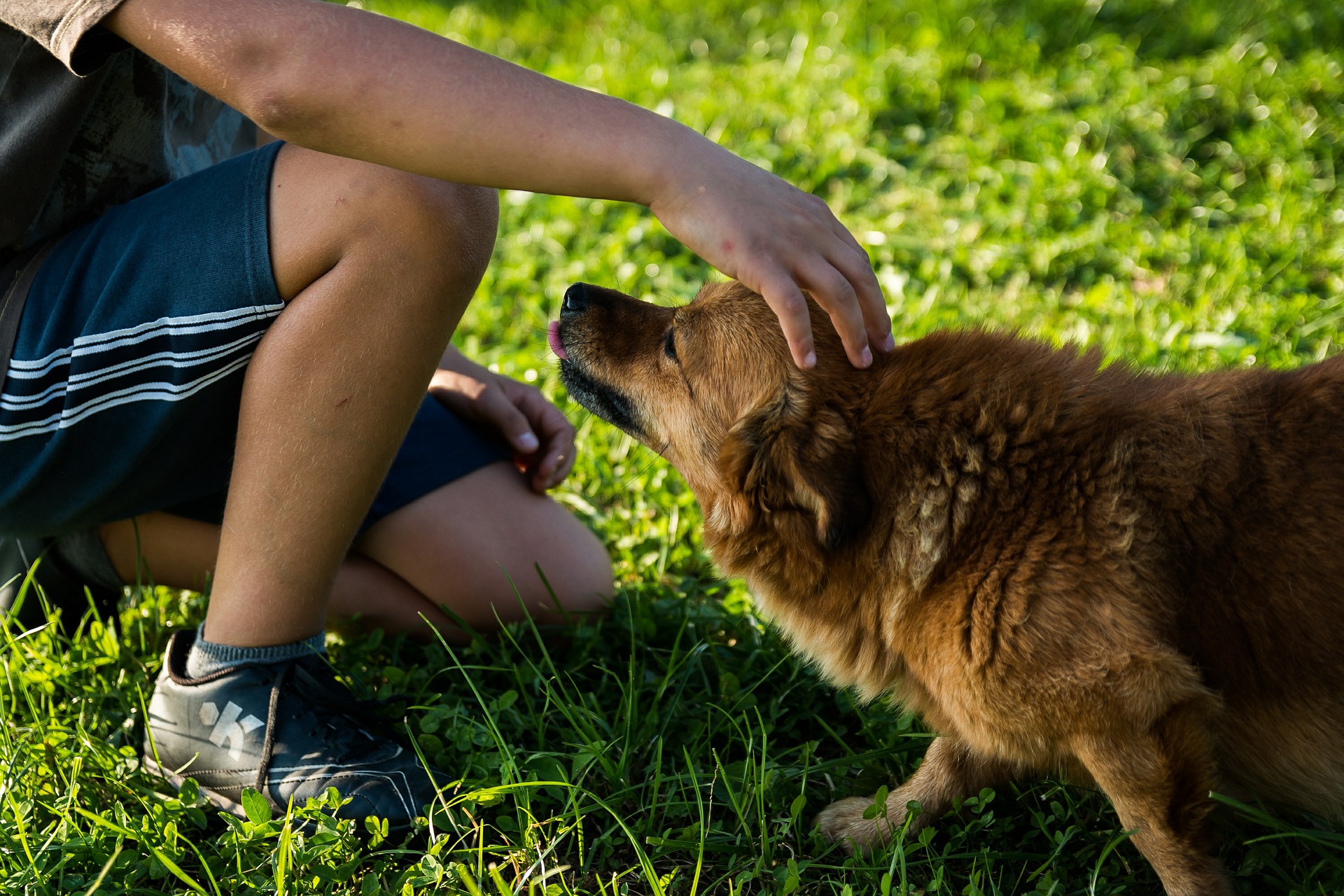
Imagine you are enjoying a nice meal, including a delicious piece of cheese... Then you realize that your dog’s big, loving eyes are staring at you, hoping to get a small bit (or not so small). What should you do?
You may be wondering, “Can dogs eat cheese?” The answer is not as simple as a straightforward “yes” or “no.” While cheese can be a tasty treat for some dogs, it's essential to know the potential benefits and risks before offering it to your furry friend as a snack.
Let’s take a closer look at whether cheese is a safe and healthy option for your dog and what you need to consider before sharing that tempting bite!

Pros of Cheese for Dogs
High in Protein and Calcium
Cheese is a great source of protein, which is an essential nutrient for muscle development, tissue repair, and overall health. Additionally, it is rich in calcium, which supports bone and teeth development. This is especially beneficial for puppies growing up and for aging dogs that may suffer from bone density loss.
A Tasty and High-Value Treat for Training
Many dogs love cheese, making it an effective high-value reward during training sessions. If your paw friend loves cheese, you can use it when teaching them new behaviors, rewarding them for excellent performance, or encouraging them to perform a task in high-distraction environments.
High-value treats like cheese bits can be particularly useful in service dog training to reinforce desired tasks. Because of its rich flavor, small pieces of cheese can hold a dog’s attention better than standard kibble or commercial treats.
Helps with Taking Medication
Many pet owners have learned to get creative when giving their pets pills. Luckily, hiding medication in food has proved to be a great way to administer pills to an uncooperative dog.
Wrapping a pill in a small cube of cheese can make the medicine more appealing and easier to swallow, which will save you time and spare your nerves from the stress of forcing it down. However, remember to consult your vet first, as some medications may not be safe when taken with dairy products.
Contains Beneficial Nutrients
Cheese is rich in calcium, protein, and fat. It also has a high content of vitamins A and B12, phosphorus, riboflavin, and zinc.
These vitamins support healthy vision and immune function (Vitamin A), energy metabolism (B2), nervous system and brain health (B12), bone strength, and heart health (K2).
Some Types of Cheese Are Low in Lactose
Many dogs struggle with digesting lactose (the sugar found in dairy), but some types of cheese contain less lactose than milk, making them easier to digest.
Cheeses like Aged Cheddar, Gouda, Swiss (Emmental), and Parmesan have lower lactose levels and are generally safer options for dogs that don't tolerate dairy well.

Cons of Cheese for Dogs
High in Fat and Calories
Many types of cheese contain high levels of fat, which can lead to weight gain and obesity. It can also increase the risk of pancreatitis (a serious inflammation of the pancreas).
Dogs that are overweight or prone to pancreatitis, such as Miniature Schnauzers, Cocker Spaniels, and Yorkshire Terriers, should only have cheese in small amounts or not at all.
If you want to give your paw friend a bit of cheese but need to reduce fat intake, consider opting for low-fat cheeses like mozzarella, cottage cheese, or ricotta.
High Sodium Content in Some Cheeses
Some cheeses, especially processed ones like American cheese or feta, contain high levels of salt, which can cause dehydration, excessive thirst, increased blood pressure, and kidney strain.
If your furry companion has a heart disease, kidney disease, or high blood pressure, they should avoid high-sodium cheeses. Stick to natural, unsalted, or low-sodium cheeses if you want to give your dog a small treat.
Some Dogs Are Lactose Intolerant
Not all dogs can digest dairy properly. Lactose intolerance occurs when a dog lacks sufficient lactase, the enzyme that breaks down lactose in dairy products. Signs of lactose intolerance include diarrhea, gas and bloating, vomiting, and stomach discomfort
If your dog shows these symptoms after eating cheese, consider opting for low-lactose cheese options or avoid dairy altogether.
Some Cheeses Contain Harmful Additives
Certain cheese types may contain toxic ingredients that are dangerous for dogs, including:
- Onion or garlic cheese, as both onion and garlic are toxic to dogs and can cause anemia by destroying red blood cells.
- Blue Cheese (Roquefort, Stilton, Gorgonzola, etc.), as these contain a fungus that produces roquefortine C, a substance that can cause tremors, seizures, and digestive upset in dogs.
- Cheese types with herbs or spices such as chives, onions, or hot peppers, which can be irritating or toxic to dogs.
We strongly recommend that you always read the label before giving cheese to your dog and avoid any types of cheese with added flavors or seasonings. Some cheeses may contain added flavorings, preservatives, or other ingredients that can be harmful to your dog, even if they don’t contain onion or garlic.
Can Be a Choking Hazard
If given in large pieces, cheese can pose a choking hazard, particularly for small dogs or those that tend to gulp their food without chewing properly. To prevent this, consider cutting it into very small pieces.

Best Types of Cheese for Dogs
When choosing cheese for your paw companion, it’s important to consider factors like fat content, lactose levels, and whether they have any food sensitivities. We’ll list several types of cheese considered the safest options for dogs:
Mozzarella
Mozzarella is lower in fat than many other cheeses, which makes it a good option for occasional treats. It’s also relatively mild in flavor and less likely to upset your dog's stomach.
Cottage Cheese
Cottage cheese is low in fat and high in protein. It’s also typically lower in lactose compared to other cheese types, making it a better choice for dogs with lactose sensitivity.
It’s important, though, to ensure it’s plain, without added salt or flavorings.
Ricotta
Ricotta is another cheese that’s lower in fat and lactose, making it a suitable choice for dogs with lactose sensitivity. It’s softer in texture, which can make it easier to digest for dogs with more sensitive stomachs.
Cheddar (Aged)
Aged cheddar has less lactose because the aging process breaks it down. It’s also rich in calcium and protein. However, due to its high fat content, it should be eaten in moderation.
Swiss Cheese
Swiss cheese is relatively low in lactose and fat, which makes it a decent option for occasional treats.
Parmesan (Aged)
Like cheddar, aged Parmesan contains less lactose and is a good option for small treats. It has a hard texture, making it a great choice for dogs that enjoy chewing.
Havarti
Havarti is mild and lower in fat than other cheeses, and its creamy texture can be appealing to dogs.

How Much Cheese Should You Give Your Dog?
When it comes to feeding your dog cheese, remember that moderation makes the difference!
Cheese should only be given as an occasional treat, not as a main part of their diet. Too much cheese can cause your dog to gain weight, upset their stomach, or even lead to pancreatitis in dogs prone to this condition.
For most dogs, a small cube or slice of cheese as an occasional training treat or snack is perfectly fine.
A quick tip to follow is to ensure that cheese makes up no more than 10% of your dog’s daily calorie intake.

Signs of Cheese Sensitivity
If you decide to reward your furry friend with cheese, remember to supervise them and look for any signs of digestive upset, such as:
- Gas;
- Bloating;
- Diarrhea;
- Vomiting;
- Lethargy.
If you notice any signs of digestive upset, such as gas, bloating, diarrhea, vomiting, or lethargy, it’s best to avoid giving your dog cheese in the future and consult your vet.











